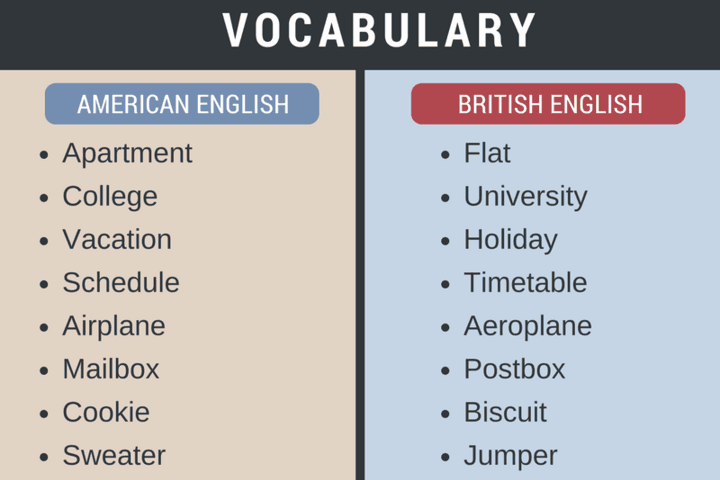April 25, 2023
The difference between American and British English
The difference between American and British English

Did you know that the English language comprises many different dialects, including British English, Canadian English, American English, and Australian English?
Before explaining the key differences between these English dialects, it’s important to understand why these differences exist in the first place.
What is a dialect?
Put simply, dialects are slightly different versions of the same language that can be understood by all speakers of that language but that vary in systematic ways. They are typically spoken in particular areas by specific groups of people.
These diverse versions of a particular language come about due to various differences between speakers of a given language, such as geographical, social, and cultural factors.
How do dialects differ?
So how, exactly, do dialects differ? Typically, dialects vary in terms of their grammar, spelling, vocabulary, use of punctuation, and pronunciation of certain words.
In what ways do British English, American English, and Canadian English differ?
Setting aside their differences in pronunciation (which don’t matter too much when you’re working with written content), these three English dialects differ in the following five important ways:
Below, we explain some of the key differences related to each of these points.
1. British vs. American spelling
All three dialects contain slight differences in how they spell common words.
For example:
- While American English and Canadian English typically end words like “apologize” with -ize, such words usually end with -ise in British English.
- Some words than end in -or in American English typically end with -our in Canadian and British English.
- Some words that end in -er in American English typically end with -re in Canadian and British English.
- American and Canadian English use “toward,” while British English uses “towards.”
You can reference the chart below for a more detailed summary of some of these key differences.

2. Quotation marks in British vs. American English
Double quotation marks are typically used in Canadian and American English, and the final punctuation mark is typically placed inside the quotation marks.
A quote within a quote is indicated using single quotation marks within the outer double quotation marks.
Examples:
As Sanders et al. (2003, p. 33) reported, “Only 43% of people really know how to cook pasta.”
Smith and Wang (2021, p. 893) reported that “we may not always let ‘the right one’ in, but there’s something to be said for keeping our defenses up.”
However, British English typically prefers single quotation marks, and final punctuation marks are typically placed outside quotation marks, except when the final punctuation mark that appears in one’s own work is retained in the same place as in the original work.
A quote within a quote is indicated using double quotation marks within the outer single quotation marks.
Examples:
As Sanders et al. (2003, p. 33) reported, ‘Only 43% of people really know how to cook pasta’.
Smith and Wang (2021, p. 893) reported that ‘we may not always let “the right one” in, but there’s something to be said for keeping our defenses up’.
3. Commas in American vs. English English
The English dialects also differ in terms of their preference for the use of the serial comma, also known as the Oxford comma.
A serial comma is always preferred in American English, typically preferred in Canadian English, and generally discouraged in British English, except when required to ensure clarity.
For example:
Americans and Canadians would prefer, “She bought buns, almond milk, carrots, potatoes, and wine.”
However, Brits would prefer, ‘She bought buns, almond milk, carrots, potatoes and wine’.
4. Dates in American vs. British English
Chances are, you’ve seen dates formatted in various ways. In our increasingly globalized world, it’s impossible not to come across such differences in taste.
In general, Americans prefer to format dates in the following way: month/day/year.
For example:
May 6, 2023
05/06/2023
However, Brits typically prefer to format dates like this: day/month/year.
For example:
6 May 2023
06/05/2023
In Canada, you’ll find dates formatted in both ways, but the month/day/year format is more common.
5. Vocabulary in British vs. American English
Some words that are commonly understood and frequently used in one English dialect may be uncommon or misunderstood in another dialect.
For example, while it might be commonplace for a British person to say they’re going to grab something from the “boot” of their car, an American might be puzzled by this expression.
Similarly, while a Canadian might say that they’re going to grab their “flashlight” when the lights start to flicker, a British person would likely say they’re going to grab their “torch.”
Below are some examples of common differences between American English and British English vocabularies.

Which dialect should I use?
Now, you might be wondering: if so many different versions of the English language exist, how do you know which one is the right one?
Strictly speaking, from a big-picture perspective, no particular dialect is more or less “correct,” “true,” or “authentic” than others. Which dialect is the most appropriate to use depends largely on context.
For example, if you’re a university student studying in the UK, British English would likely be the most appropriate dialect to use in your day-to-day school-related writing.
As an author, you can rest assured that most colleges, universities, and professional publishers (e.g., academic journals and book publishers) provide guidance on which English dialect you should use. Just be sure to read the guidelines provided to you carefully!
When in doubt, it is generally best to use the dialect that corresponds to the location of the publisher, not your own location.
For example, if you are a British student applying to an American university, it would be best to write your admissions essays in US English.
Summary
While this article has pointed out some of the key differences between three English dialects—Canadian English, American English, and British English—it has not provided an exhaustive account of all the ways in which they differ.
If you’re working on an important document, such as an admissions essay, term paper, thesis, dissertation, research paper, or book, a professional editor can help ensure that your document meets the requirements of your preferred English dialect.
For a free, no-obligation quote for our proofreading and editing services, you can get in touch with us here.

Jess Blackwell
Jess is the founder of Lumida Ltd., a passionate environmentalist living a low-waste life, and a lifelong writer. When she isn't helping our clients make their writing shine, Jess can be found working on her writing projects, experimenting in the kitchen, or taking nature walks.
Share this.





